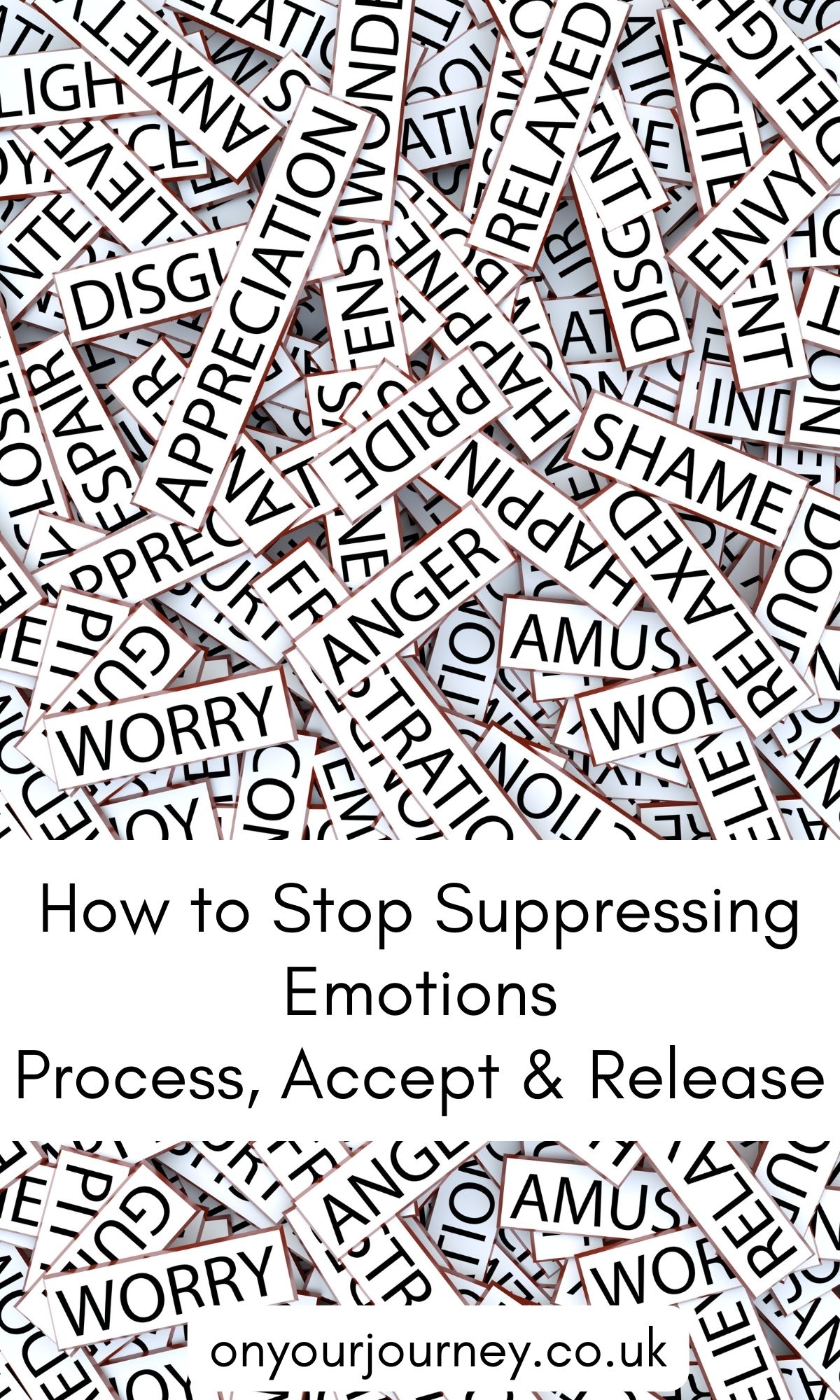We’ve all been there. Something happens that stirs up strong emotions, and instead of expressing them, we push them down. We tell ourselves to stay strong, carry on, and deal with it later. But here’s the catch: “later” never comes.
This emotional suppression might seem like the easiest route at the moment, but it’s a temporary relief that can lead to long-term health problems, both physically and mentally.
Suppressing and repressing emotions can go as far back as childhood. Many of us learned to bury our feelings as a defense mechanism against difficult emotions and traumatic events. We thought if we just ignored those negative emotions, they’d go away.
But suppressed emotions don’t disappear; they linger, causing emotional distress and even physical symptoms like high blood pressure and heart disease.
It’s a complex process, but it’s crucial for our emotional health to address these buried feelings.

Why Do We Suppress Emotions?
For various reasons, we avoid expressing emotions. It might be due to childhood trauma, an uncomfortable situation at work, or negative events we’d rather forget.
Society often sends the message that showing our true feelings is a sign of weakness. We might have learned from a family member or through social media that it’s better to keep a stiff upper lip.
However, emotional suppression only leads to emotional pain and mental health issues like anxiety, depression, and even post-traumatic stress disorder (PTSD).
Many of us suppress emotions because we believe it’s easier to deny and ignore hard feelings rather than face them.
Sometimes, this coping style starts in childhood when we might have been taught that showing emotions is bad or shameful. Defense mechanisms like this serve to protect us in the short term, but in the long run, they prevent us from experiencing positive emotions and true emotional health.
As adults, we continue this pattern, thinking that pushing away negative thoughts will protect us from pain. In reality, this suppression builds up, leading to emotional distress and a disconnect from our true feelings.
It’s so important to understand that feeling and expressing emotions is not a sign of weakness but a natural and essential part of being human. Acknowledging this can be the first step toward healthier emotional expression.
The Impact of Suppressing Emotions
When we ignore our emotional experiences, we deny a core component of our true self. Emotional repression can manifest in harmful ways such as substance abuse, unhealthy coping mechanisms, and even physical health problems.
Have you ever noticed how your body feels after a long time of holding in stress? That tight chest, headache, or stomachache is your body screaming for you to pay attention to your emotional needs.

So, we can see that suppressing emotions doesn’t just affect your mind; it impacts your whole body.
The stress from unprocessed feelings and the suppression of emotions can lead to physical symptoms like headaches, high blood pressure, and even heart disease. When we consistently avoid dealing with our emotions, our bodies pay the price.
Emotion suppression is a big deal because it affects not only our mental health but also our physical well-being.

This ongoing emotional pain can lead to chronic mental health conditions such as anxiety and depression. It’s as if these suppressed emotions are a weight that we carry around, affecting our overall well-being and happiness.
By understanding the deep impact of emotional repression, we can see the importance of addressing and processing our feelings for a healthier life.
Suppressing emotions can also lead to explosive ways of releasing them later on, which might manifest as sudden outbursts or other particular behaviors that are hard to control. And, suppressed emotions can result in unconscious thoughts influencing our actions without us even realizing it. When we suppress emotions, it often leads to unpleasant experiences in other areas of our lives, such as strained relationships or poor job performance.
I remember the day I decided to face my own emotions. I had been carrying around old wounds from my childhood, pushing down negative thoughts, and pretending everything was fine. But the emotional distress was catching up with me. It wasn’t until I went to therapy that I learned the only way to process feelings is to actually feel them.

Starting my journey with emotional expression wasn’t easy. Initially, it felt like opening old wounds, and I was scared of what I might find.
However, with the help of my therapist, I learned that confronting these feelings was a necessary part of healing. Therapy taught me that every emotion, even the difficult ones, has value.
Through this process, I discovered that expressing emotions helped me connect with my true self and understand my past experiences better. It was a transformative experience, showing me that feeling my emotions deeply and honestly was a path to inner peace and emotional health. Recognizing my emotional response to various situations has also helped me develop better emotional regulation.
Steps to Process, Accept, and Release Emotions
Acknowledging your feelings is like turning on a light in a dark room. It can be overwhelming at first, but it’s the only way to see clearly. Once you’ve named your emotions, finding a safe space to explore them is crucial.
This could be a trusted friend’s presence, a quiet room, or even a creative outlet like art or music. When you express your emotions, you release their hold on you. Whether through writing, speaking, or physical activity, this expression allows you to process and let go of negative feelings.
Accepting your emotions without judgment is a powerful act of self-compassion, leading to emotional regulation and healthier coping strategies. Our personality traits and coping styles are often shaped by how we deal with our emotions, highlighting the importance of addressing them healthily.

- Acknowledge Your Feelings: The first step is recognizing and naming your emotions. Whether they are intense emotions or uncomfortable feelings, giving them a name takes away some of their power.
- Find a Safe Space: Creating a safe space for yourself is crucial. This could be a quiet room, a journal, or a trusted friend who will listen without judgment. Developing healthy ways to cope with emotions, such as mindfulness practices and journaling, can help us stay grounded in the present moment.
- Express Emotions: Don’t be afraid to express anger, sadness, or any other emotion. Whether they are old emotions left over from traumatic childhood experiences, or recent hurt feelings – they all need to be cleared out. Cry if you need to, scream into a pillow, or write down your thoughts. Emotional expression is a healthy way to release pent-up feelings.
- Practice Emotional Regulation: Developing healthy coping mechanisms like deep breathing, meditation, or physical activity can help you manage strong emotions. Emotional regulation doesn’t mean suppressing them but learning how to navigate them.
- Seek Professional Help: Sometimes, dealing with painful emotions and past experiences requires the help of a mental health professional. Therapy can provide you with productive ways to cope and heal from emotional suppression, especially if it’s resulted from past traumatic experiences.
- Accept and Release: Accepting your emotions means allowing yourself to feel them without judgment. It’s okay to have negative feelings; they are a natural part of being human. Once you accept them, you can release them, freeing yourself from their hold.
The journey of processing and releasing your emotions can be challenging, but the rewards are immense.
You’ll notice that your emotional reactions become more balanced, and you’re able to handle stressful situations with greater ease. Expressing emotions can lead to a body feel that is lighter and more at ease, improving overall health.
This emotional intelligence and regulation not only improve your mental health but also enhance your relationships and overall quality of life. Embracing all parts of your inner world leads to a deeper understanding of yourself and a more authentic, fulfilling life.
By addressing and processing our emotions, we can transform unpleasant experiences into opportunities for growth and healing.

Each step you take towards emotional freedom brings you closer to a happier, healthier you. It’s a journey worth taking, and the positive impact on your well-being will be profound.
The good thing about facing your emotions is that it leads to a deeper understanding of yourself and better emotional health. You’ll find that your emotional reactions to stressful situations become more manageable. The next time you’re faced with difficult emotions, you’ll have the coping skills to handle them in a healthy way.
In the end, processing, accepting, and releasing your emotions is not just about mental well-being but your overall physical well-being too. It’s about living authentically and embracing all parts of your inner world.
So take that deep breath, and start your journey towards emotional freedom today. You’ve got this!
More on Mental Wellbeing
- 17 Easy Ways to Overcome Emotional Dependency
- 17 Best Ways To Emotionally Detach From A Narcissist
- 12 Trauma Release Exercises For Healing & Releasing
- 12 Recommended Best Books For Healing Childhood Trauma
- How to Stop Needing Constant Reassurance: Finding Confidence and Calm
- Traumatic Events in Childhood: Understanding The trauma, Healing, and Moving Beyond Adverse Experiences
Anna is a Wales-based writer and graduate from SOAS University of London.
As the voice behind On Your Journey, she empowers women to embrace holistic well-being and spiritual growth through her expert insights into wellness and symbolism.
When she isn't writing thought-provoking articles, you'll find her busy crafting and raising her 4 children.